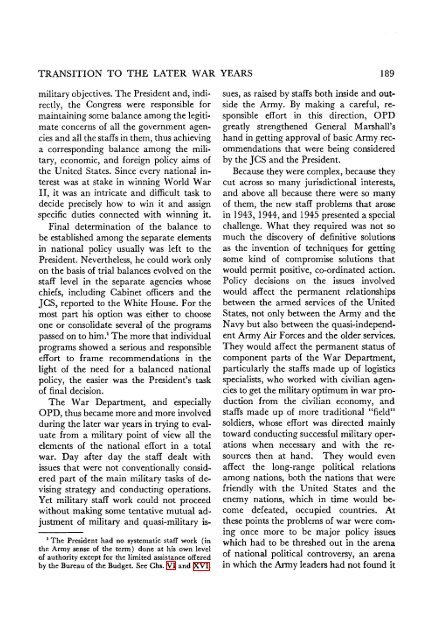To download as PDF click here - US Army Center Of Military History
To download as PDF click here - US Army Center Of Military History
To download as PDF click here - US Army Center Of Military History
You also want an ePaper? Increase the reach of your titles
YUMPU automatically turns print PDFs into web optimized ePapers that Google loves.
TRANSITION TO THE LATER WAR YEARS 189<br />
military objectives. The President and, indirectly,<br />
the Congress were responsible for<br />
maintaining some balance among the legitimate<br />
concerns of all the government agencies<br />
and all the staffs in them, thus achieving<br />
a corresponding balance among the military,<br />
economic, and foreign policy aims of<br />
the United States. Since every national interest<br />
w<strong>as</strong> at stake in winning World War<br />
II, it w<strong>as</strong> an intricate and difficult t<strong>as</strong>k to<br />
decide precisely how to win it and <strong>as</strong>sign<br />
specific duties connected with winning it.<br />
Final determination of the balance to<br />
be established among the separate elements<br />
in national policy usually w<strong>as</strong> left to the<br />
President. Nevertheless, he could work only<br />
on the b<strong>as</strong>is of trial balances evolved on the<br />
staff level in the separate agencies whose<br />
chiefs, including Cabinet officers and the<br />
JCS, reported to the White House. For the<br />
most part his option w<strong>as</strong> either to choose<br />
one or consolidate several of the programs<br />
p<strong>as</strong>sed on to him. 1<br />
The more that individual<br />
programs showed a serious and responsible<br />
effort to frame recommendations in the<br />
light of the need for a balanced national<br />
policy, the e<strong>as</strong>ier w<strong>as</strong> the President's t<strong>as</strong>k<br />
of final decision.<br />
The War Department, and especially<br />
OPD, thus became more and more involved<br />
during the later war years in trying to evaluate<br />
from a military point of view all the<br />
elements of the national effort in a total<br />
war. Day after day the staff dealt with<br />
issues that were not conventionally considered<br />
part of the main military t<strong>as</strong>ks of devising<br />
strategy and conducting operations.<br />
Yet military staff work could not proceed<br />
without making some tentative mutual adjustment<br />
of military and qu<strong>as</strong>i-military is-<br />
1 The President had no systematic staff work (in<br />
the <strong>Army</strong> sense of the term) done at his own level<br />
of authority except for the limited <strong>as</strong>sistance offered<br />
by the Bureau of the Budget. See Chs. VI and XVI.<br />
sues, <strong>as</strong> raised by staffs both inside and outside<br />
the <strong>Army</strong>. By making a careful, responsible<br />
effort in this direction, OPD<br />
greatly strengthened General Marshall's<br />
hand in getting approval of b<strong>as</strong>ic <strong>Army</strong> recommendations<br />
that were being considered<br />
by the JCS and the President.<br />
Because they were complex, because they<br />
cut across so many jurisdictional interests,<br />
and above all because t<strong>here</strong> were so many<br />
of them, the new staff problems that arose<br />
in 1943, 1944, and 1945 presented a special<br />
challenge. What they required w<strong>as</strong> not so<br />
much the discovery of definitive solutions<br />
<strong>as</strong> the invention of techniques for getting<br />
some kind of compromise solutions that<br />
would permit positive, co-ordinated action.<br />
Policy decisions on the issues involved<br />
would affect the permanent relationships<br />
between the armed services of the United<br />
States, not only between the <strong>Army</strong> and the<br />
Navy but also between the qu<strong>as</strong>i-independent<br />
<strong>Army</strong> Air Forces and the older services.<br />
They would affect the permanent status of<br />
component parts of the War Department,<br />
particularly the staffs made up of logistics<br />
specialists, who worked with civilian agencies<br />
to get the military optimum in war production<br />
from the civilian economy, and<br />
staffs made up of more traditional "field"<br />
soldiers, whose effort w<strong>as</strong> directed mainly<br />
toward conducting successful military operations<br />
when necessary and with the resources<br />
then at hand. They would even<br />
affect the long-range political relations<br />
among nations, both the nations that were<br />
friendly with the United States and the<br />
enemy nations, which in time would become<br />
defeated, occupied countries. At<br />
these points the problems of war were coming<br />
once more to be major policy issues<br />
which had to be threshed out in the arena<br />
of national political controversy, an arena<br />
in which the <strong>Army</strong> leaders had not found it
















